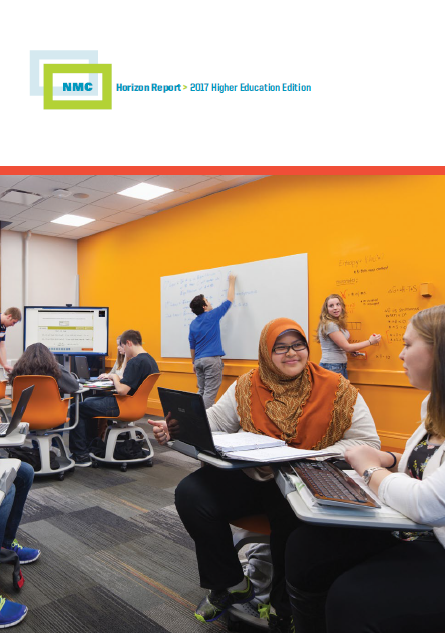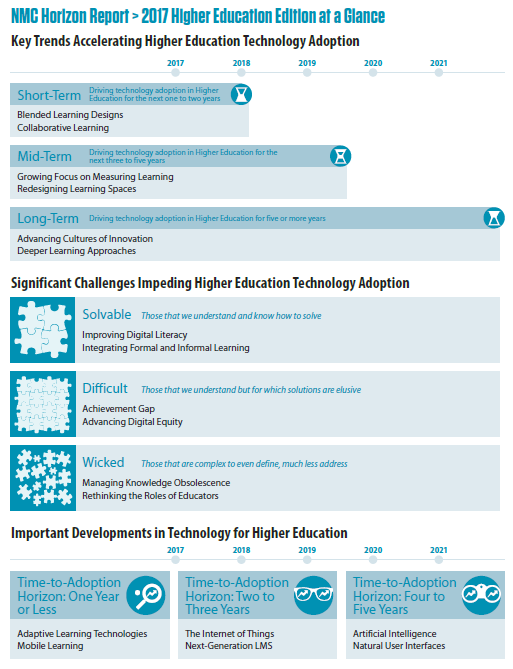Tour d’Horizon: Quebec Colleges and the 2017 Horizon Report on Ed Tech
The New Media Consortium’s annual Higher Education Edition of the Horizon Report [PDF] is out! Each year the report provides us with an opportunity as educators to stop, take stock and reflect on our use of technology in the classroom. An international panel of 78 experts contributed to the advancement of the discussion that fed into this year’s report, whose findings will likely resonate with many stakeholders from Quebec’s college network.

The cover of the NMC’s Horizon Report – 2017 Higher Education Edition [PDF].
The Horizon Report is divided into 3 sections:
- Key trends accelerating the adoption of Ed Tech
- Significant challenges impeding this adoption (which won’t be addressed in this article)
- Important developments in education technology
An infographic included in the executive summary gives the reader a concise overview of the 6 elements in each of the 3 sections.

A visual summary of this year’s report (Source: Adams Becker, S., Cummins, M., Davis, A., Freeman, A., Hall Giesinger, C.,and Ananthanarayanan, V. (2017). NMC Horizon Report: 2017 Higher Education Edition. Austin, Texas: The New Media Consortium.)
Key Trends Accelerating Higher Education Technology Adoption
The Horizon Report divides this section according to short, medium and long-term trends related to the adoption of education technology. In the short term, blended and collaborative learning were identified as being good candidates for implementation.
Quebec colleges are already experimenting with a variety of blended learning designs and collaborative learning. Blended learning responds to both the increased calls for flexibility in learning and the desire of certain educators to spend more class time on project-based learning or practical application, rather than traditional lectures.
In the medium term, the publishers of the Horizon Report feel that there will be a growing focus on measuring learning. The promise of improving measurement of learning is to be able to provide adaptive learning possibilities, interventions for at-risk students and ultimately improve student success. In Quebec, we will need to invest serious capital and efforts to organize and aggregate data and must insist that proprietary vendors of student information systems collaborate with us to build these tools. Rafael Scapin, Dawson College’s IT-Representative, did a thoughtful presentation on Learning Analytics in 2015 that provides a good introduction to the subject.
Also in the medium term, there will also be a larger emphasis on redesigning learning spaces, which may take a while to implement in universities with large class sizes, but the colleges in Quebec have already been building Active Learning Classrooms and rethinking the classroom for a few years now. We are also fortunate to have the SALTISE community of practice in place for us to share best practices and further research in this area.
In the long term, the Horizon Report identifies Advancing cultures of innovation and deeper learning approaches.The cultures of innovation that are addressed here call for a rapprochement between educational establishments and the economy by increasing the amount of applied learning. For me, the number of makerspaces appearing in the colleges combined with the continued existence of the Centres collégiaux de transfert de technologies tells me that we are already firmly entrenched within this movement!
Important Developments in Technology for Higher Education
The Horizon Report divides these developments according to the timeframe for their implementation, from 1 year or less, to 2-3 years to up to 5 years.
In the short term, Adaptive Learning Technologies and Mobile Learning are cited as likely to be adopted. Profweb has reported on a number of initiatives in the last couple of years to integrate the use of smartphones in class, whether it be for responding to polls or taking video selfies. There have been a number of initiatives to use iPads and other tablets within the classroom. The wireless nature of these devices allows for greater mobility. In terms of Adaptive Learning Technologies (learning that adjusts to the needs of learners), we’re not quite there yet, though some colleges are developing early warning systems for Academic Advisors to intervene and encourage students to continue. If you’ve heard of any initiatives, please contact me or use the comments feature below!
In the 2-3 year span, Internet of Things and the next generation learning management system (LMS) are likely to be adopted according to the Horizon report.
I recently heard a radio commercial from Investissement Québec inciting manufacturers to reinvent themselves in the age of the Internet of Things. Luckily for college teachers, La Vitrine technologie-éducation has been organizing a series of tutorials on the Raspberry Pi single-board computer and has an upcoming workshop (in May 2017) on the Arduino controller. These 2 low-cost, and approachable technologies are the most likely candidates that will be adopted for use as platforms for teaching related to the Internet of Things.
Many of the colleges are currently using Moodle and LEA as learning management systems. The expert panel that contributed to the Horizon Report pointed to the future ‘unbundling’ of education into discrete components (learning objects, etc.) as the impetus for starting to work on the the next generation LMS. Will our 2 primary LMSes evolve to take this new reality into account, or will a new player arrive on the scene to handle both ‘legacy’ courses and the new approach? Stay tuned!
A bit farther down the road, in the 5-year adoption perspective, artificial intelligence and natural user interfaces were cited as possible technologies that will be adopted. Recently, Gheorghe Comanici, a member of the Google Montreal team presented a conference on machine learning, artificial and augmented intelligence as part of Dawson College’s Ed Tech Week 2017. If you are interested in these fields, Dawson has made a video of the presentation available.
The Horizon Report as a Mirror
While this article has endeavoured to whet your appetite for the report by looking at some highlights, I would encourage the readership to take the time to read the entire report – even if it is a few pages per day. Not only will you digest all of the exciting things that are going on around the world in education technology, but you will be provided with links to additional reading for topics that you would like to explore further.
One of the greatest things about working as an Editor at Profweb is the opportunity to meet talented teachers, support staff, professionals, administrators and members of ministerial ICT partners from the college network. While reading this year’s report, I had a wonderful feeling of collective pride, as I realized that many of our colleagues in the network are blazing trails as pioneers along with some of the most renowned educational establishments in the world. An example? As higher education looks at ways to encourage deeper learning, the competency-based approach is cited within the report as a key element to develop for the future. Quebec demonstrated an impressive amount of clairvoyance in its insistence on developing this approach, and we are all part of the avant-garde of this movement. I would even go so far as to wager that the world will be looking our way for insight and assistance moving forward. It’s our moment to shine!
A Video Summary of the 2017 NMC Horizon Report (Higher Education Edition).

